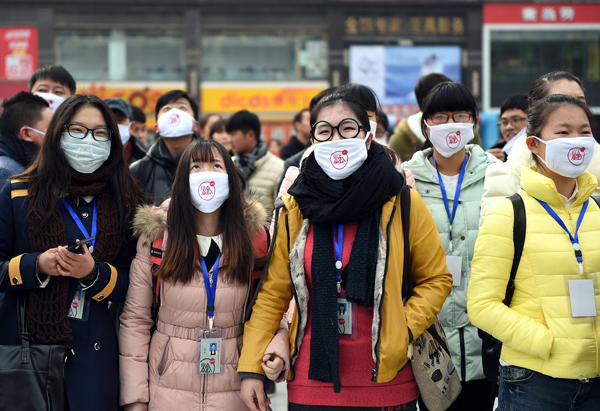 |
|
A group of people wear facial masks at a performance art event to protest against smog in Zhengzhou city, Henan province, Dec 20. [Photo/CFP] |
Smog is a hot topic at the Two Sessions with Premier Li Keqiang vowing to enforce environmental regulations in the Government Work Report.
The efforts made by governments at all levels to curb pollution have had an positive effect in the past year, which to many marks the first year that the air pollution has been reined in. More importantly, a mechanism for cross-regional cooperation involving both short-term emergency measures and long-term institutional endeavors, is taking shape.
According to statistics released by the Ministry of Environmental Protection, all 74 major Chinese cities subject to air quality monitoring of PM2.5, carbon monoxide and ozone, reportedly met the national standards for clear air on 241 days on average last year. For the Beijing-Tianjin-Hebei area, which has been plagued by frequent and severe smog in recent years, the figure was 156 days. The concentration of PM2.5 in the Beijing-Tianjin-Hebei area was reduced from 106 micrograms in 2013 to 93 micrograms over the same period. Such monitoring data indicate that the country's tough pollution fight throughout 2014 began to be effective. However, despite the decrease in PM 2.5 concentration, the figure of 93 micrograms was still nearly three times higher than the standard level.
The central government has made a significant increase in its investment in air pollution control projects. By doubling its special funds for the elimination of air pollution from 5 billion yuan ($798 million) in 2013 to 10 billion last year, the central government has set an example for all local governments to follow.
Acknowledging that the root cause of most cases of air pollution is usually related to industries that generate illegal and excessive emissions, the terribly polluted Beijing-Tianjin-Hebei area, for example, witnessed several noteworthy moves aimed at cracking down on the major pollutant producers in the region.
The following numbers speak louder than any hollow bureaucratic speeches do. The capital, last year alone, weeded out nearly 476,000 vehicles generating illegal exhaust emissions, and closed some 392 polluting enterprises, such as those in the chemical and printing industries. Meanwhile, 268 local enterprises received due punishments and 31 were shut down in neighboring Tianjin, with approximately 90 suspects were held accountable for allowing pollution.
Related Stories